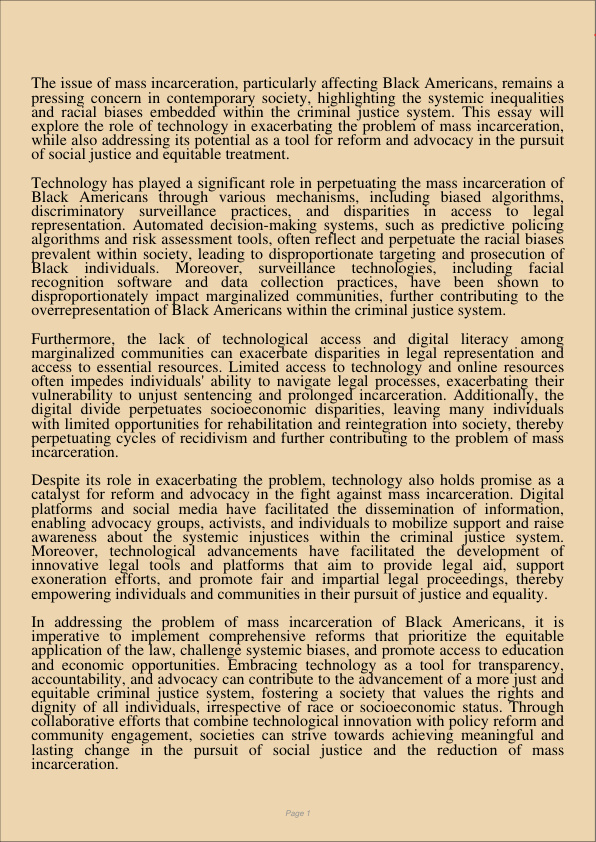Technology And Problem Of Mass Incarceration Of Black Americans
Jan 6, 2024
mass incarceration
black americans
Management
Philosophy
The issue of mass incarceration, particularly affecting Black Americans, remains a pressing concern in contemporary society, highlighting the systemic inequalities and racial biases embedded within the criminal justice system. This essay will explore the role of technology in exacerbating the problem of mass incarceration, while also addressing its potential as a tool for reform and advocacy in the pursuit of social justice and equitable treatment.
Technology has played a significant role in perpetuating the mass incarceration of Black Americans through various mechanisms, including biased algorithms, discriminatory surveillance practices, and disparities in access to legal representation. Automated decision-making systems, such as predictive policing algorithms and risk assessment tools, often reflect and perpetuate the racial biases prevalent within society, leading to disproportionate targeting and prosecution of Black individuals. Moreover, surveillance technologies, including facial recognition software and data collection practices, have been shown to disproportionately impact marginalized communities, further contributing to the overrepresentation of Black Americans within the criminal justice system.
Furthermore, the lack of technological access and digital literacy among marginalized communities can exacerbate disparities in legal representation and access to essential resources. Limited access to technology and online resources often impedes individuals’ ability to navigate legal processes, exacerbating their vulnerability to unjust sentencing and prolonged incarceration. Additionally, the digital divide perpetuates socioeconomic disparities, leaving many individuals with limited opportunities for rehabilitation and reintegration into society, thereby perpetuating cycles of recidivism and further contributing to the problem of mass incarceration.
Despite its role in exacerbating the problem, technology also holds promise as a catalyst for reform and advocacy in the fight against mass incarceration. Digital platforms and social media have facilitated the dissemination of information, enabling advocacy groups, activists, and individuals to mobilize support and raise awareness about the systemic injustices within the criminal justice system. Moreover, technological advancements have facilitated the development of innovative legal tools and platforms that aim to provide legal aid, support exoneration efforts, and promote fair and impartial legal proceedings, thereby empowering individuals and communities in their pursuit of justice and equality.
In addressing the problem of mass incarceration of Black Americans, it is imperative to implement comprehensive reforms that prioritize the equitable application of the law, challenge systemic biases, and promote access to education and economic opportunities. Embracing technology as a tool for transparency, accountability, and advocacy can contribute to the advancement of a more just and equitable criminal justice system, fostering a society that values the rights and dignity of all individuals, irrespective of race or socioeconomic status. Through collaborative efforts that combine technological innovation with policy reform and community engagement, societies can strive towards achieving meaningful and lasting change in the pursuit of social justice and the reduction of mass incarceration.
